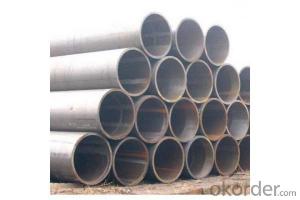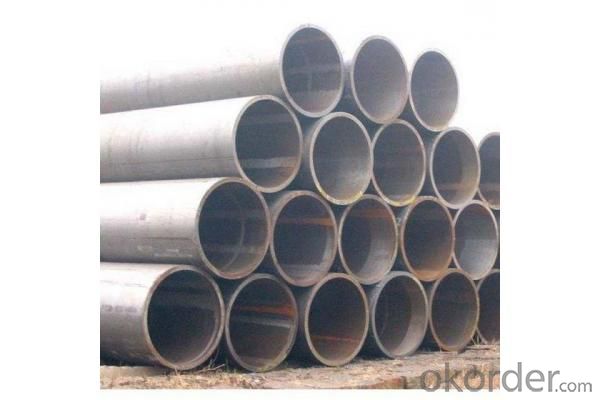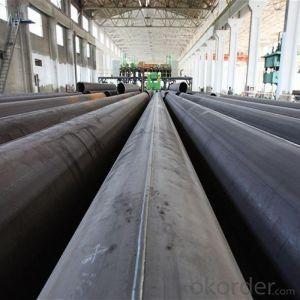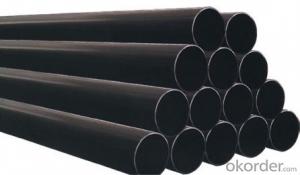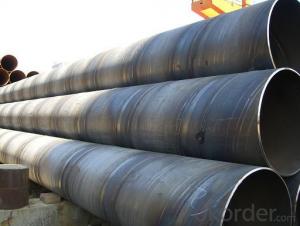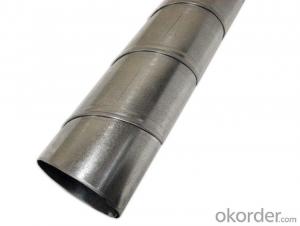API SSAW LSAW CARBON STEEL PIPE LINE OIL GAS PIPE 32'' 46'' 56'' 58''
- Loading Port:
- Tianjin
- Payment Terms:
- TT OR LC
- Min Order Qty:
- 5 m.t.
- Supply Capability:
- 3000 m.t./month
OKorder Service Pledge
OKorder Financial Service
You Might Also Like
Packaging & Delivery
Packaging Detail: | standard export packing or as customer's requirement |
Delivery Detail: | within 10 - 30 days |
Specifications
Spiral Welded Steel Pipes and Tubes
1.Material:Q195-Q235
2.Length:1-12m
3.WT:1.0-14mm
4.O.D.:20-273mm
Spiral Welded Steel Pipes and Tubes
Product Description:
1.Material : Q235,Q345,L245,L290,L360,L415,L450,L485,GrB,X42,46,X52,X56,X60,X65,X70,X80,X100
2,Standard: SY/T5037-2000,GB/T9711-2011,API Spec 5L PSL1/PSL2,ASTM A252\A53,ISO3183,DIN17172,EN10217,JIS G3457,AWWA C200,ASTM A139,ASTM A671,ASTM A672
3.Wall thickness: 3.0mm-30mm
4.Outer diameter: φ168mm-3020mm
5,Length: 5m-12m or as your requirement
6,Corrosion protection standard: DIN30670,DIN30671, AWWAC210, AWWA C203, SY/T0413-2002,SY/T0414-2002
7,Application: Oil, gas, natural gas, water pipe, thermal electricity pipe, steel structure engineering, etc
Q195-q345 Material Steel Pipe's Materials
Elements | Chemical Compsition% | Mechanical Property | ||||||
C% | Mn% | S% | P% | Si% | Yield Point (Mpa) | Tensile Strength(Mpa) | Elongation | |
Q195 | 0.06-0.12 | 0.25-0.50 | <0.050< span=""> | <0.045< span=""> | <0.030< span=""> | >195 | 315-430 | 32-33 |
Q215 | 0.09-0.15 | 0.25-0.55 | <0.05< span=""> | <0.045< span=""> | <0.030< span=""> | >215 | 335-450 | 26-31 |
Q235 | 0.12-0.20 | 0.30-0.70 | <0.045< span=""> | <0.045< span=""> | <0.030< span=""> | >235 | 375-500 | 24-26 |
Q345 | <0.20< span=""> | 1.0-1.6 | <0.040< span=""> | <0.040< span=""> | <0.55< span=""> | >345 | 470-630 | 21-22 |
Packaging & Delivery
Packaging Detail: | Normal exporting packing,in container or bulk vessel or as per clients' request |
Delivery Detail: | 2 months after confimed contract |
Specifications
Large Diameter API 5L X70 PSL2 LSAW Steel Pipe
Grade: X42, X46, X50, X52, X60, B, C
OD: 1.5"-28"
WT: SCH10-SCH160
Large Diameter API 5L X70 PSL2 LSAW Steel Pipe
Specifications:
u Standard: API 5L
u Grade: B, C, X42, X46, X50, X52, X56, X60, X65, X70, X80
u OD: 1.5"-28"
u WT: SCH10-SCH160
u Length: 5-12m
u Ends Finish: plain end, bevel end, grooved end
u Surface Treatment: bare, black varnished, oiled finish, red color, anti-corrosion, 3PE, FBE or epoxy coating
u Technique: hot rolled or cold drawn
u Application: api 5l steel pipe for conveying oil, water, gas
u Invoicing: based on theoretical weight or actual weight
u Payment Terms: L/C at sight, T/T or Western Union
u Trade Terms: FOB, CFR, CIF
u Certification: ABS manufacturing assessment, ABS design assessment, API 5CT, API 5L, DNV manufacturer certificate, ISO9001 quality management system certificate, ISO14001 environment management system certificate, GB/T28001 occupational health and safety management system certificate, A1 class manufacturing license of special equipment certificate, CCS, GL, LR, SGS, TüV, PDE
- Q: Are steel pipes affected by magnetic fields?
- Yes, steel pipes can be affected by magnetic fields. Steel is a ferromagnetic material, which means it can be magnetized and influenced by magnetic fields.
- Q: Can steel pipes be used for underground cable ducting?
- Underground cable ducting can utilize steel pipes, as they possess durability and strength. Due to their robustness, steel pipes commonly serve as a protective casing for cables, warding off potential harm from external factors like moisture, pressure, and environmental elements. Moreover, steel pipes exhibit resistance to corrosion, rendering them suitable for extended underground use. In addition, their ability to withstand heavy loads deems them ideal for areas where cables may face high pressure or weight. Nevertheless, before selecting steel pipes for underground cable ducting, it is vital to take into account soil conditions, installation requirements, and the specific needs of the cable system.
- Q: Can steel pipes be used for oil refinery applications?
- Yes, steel pipes can be used for oil refinery applications. Steel pipes offer many advantages for oil refinery applications including high strength, durability, and resistance to corrosion. They are able to withstand high pressure and temperature conditions that are common in oil refinery operations. Steel pipes are also easy to transport and install, making them a popular choice for oil refinery projects. Additionally, steel pipes can be customized to meet specific requirements such as size, thickness, and coating, making them suitable for a wide range of oil refinery applications.
- Q: How do steel pipes handle pressure surges?
- Steel pipes are known for their strength and durability, which allows them to handle pressure surges effectively. When pressure surges occur in a pipeline system, steel pipes have the ability to withstand and absorb the increased force without breaking or rupturing. The high tensile strength of steel provides resistance against the pressure exerted on the pipes, preventing them from deforming or collapsing under the sudden surge. Additionally, steel pipes have a high burst pressure rating, meaning they can withstand significant increases in pressure without failing. Furthermore, steel pipes are often designed with a thicker wall thickness, which adds to their ability to handle pressure surges. The thickness of the pipe walls helps to distribute the increased force evenly, minimizing the risk of localized stress and potential failure points. Moreover, steel pipes are commonly used in conjunction with fittings and valves that are specifically designed to handle pressure surges. These fittings and valves are made from similar materials, ensuring compatibility and maintaining the integrity of the pipeline system. Overall, steel pipes are well-suited for handling pressure surges due to their strength, durability, and ability to withstand high pressures. Their resistance to deformation, high burst pressure rating, and compatibility with specialized fittings and valves make them a reliable choice for applications where pressure surges may occur.
- Q: How are steel pipes used in the construction of nuclear power plants?
- Steel pipes are widely used in the construction of nuclear power plants for various critical applications. They are employed in the primary coolant system, where they carry and circulate the pressurized water or liquid metal coolant that transfers heat from the reactor core to the steam generator. Steel pipes are also utilized in the secondary coolant system, which transports the generated steam to drive the turbine for electricity production. Additionally, steel pipes are used for the construction of various auxiliary systems, such as the emergency cooling system or the ventilation system, ensuring the safe and efficient operation of nuclear power plants.
- Q: Can steel pipes be used for drinking water supply?
- Drinking water supply can indeed utilize steel pipes. For water distribution systems, steel pipes are widely employed owing to their robustness, longevity, and capacity to endure high pressures. Nevertheless, it is crucial to highlight that the steel employed in these pipes must be purposefully engineered and endorsed for potable water applications. This ensures the water remains uncontaminated by any detrimental substances. Furthermore, regular inspections and appropriate upkeep are imperative to avert the development of rust or corrosion, which may impact water quality.
- Q: How do steel pipes withstand high pressure and temperature?
- Steel pipes are able to withstand high pressure and temperature due to their inherent properties and construction. Steel is known for its strength and durability, making it an ideal material for pipes used in demanding applications. Firstly, steel pipes are made from high-quality steel alloys that have been specifically designed to withstand extreme conditions. These alloys are chosen for their high tensile strength, which allows the pipes to withstand the internal pressure exerted by fluids or gases flowing through them. The steel used in these pipes is often alloyed with other elements such as chromium, molybdenum, or nickel to enhance its resistance to corrosion and high temperatures. Secondly, the construction of steel pipes plays a crucial role in their ability to withstand high pressure and temperature. Steel pipes are typically manufactured using a seamless or welded process. Seamless pipes are made by piercing a solid steel billet, resulting in a continuous and uniform pipe with no seams or joints. This seamless construction eliminates weak points and ensures that the pipe can handle high pressure without any risk of leakage. Welded pipes, on the other hand, are made by joining two or more pieces of steel together using a welding process. The welds are carefully inspected and tested to ensure their integrity and strength. Although welded pipes may have seams, they are equally capable of withstanding high pressure and temperature when manufactured to the appropriate standards. Additionally, steel pipes can be further reinforced to enhance their resistance to pressure and temperature. For instance, pipes used in extremely high-pressure applications may be thicker or have additional layers of protective coatings. These measures help to increase the strength and durability of the pipes, allowing them to withstand even higher pressures and temperatures. In summary, steel pipes are able to withstand high pressure and temperature due to the strength and durability of the steel alloys used in their construction. The seamless or welded construction of these pipes eliminates weak points and ensures their ability to handle extreme conditions. Additional reinforcement and protective coatings can be applied to further enhance their resistance to pressure and temperature.
- Q: What is the difference between steel pipes and concrete-lined pipes?
- Steel pipes are made entirely of steel and are known for their strength and durability. They are commonly used in various applications, including transporting liquids and gases, as well as structural support. On the other hand, concrete-lined pipes are made of steel with a layer of concrete applied to the inner surface. This concrete lining provides additional protection against corrosion and abrasion, making them suitable for transporting corrosive materials or in aggressive environments. The concrete lining also helps in reducing friction within the pipe, resulting in improved flow efficiency.
- Q: Can steel pipes be used for underground chemical injection?
- Underground chemical injection can utilize steel pipes. These pipes are widely employed across industries due to their durability, strength, and resistance to corrosion. For underground chemical injection purposes, steel pipes bring various advantages. They can endure high pressure and temperature, making them suitable for the transportation and injection of chemicals into the ground. Furthermore, steel pipes exhibit superb chemical resistance, guaranteeing that they will not interact with the injected chemicals and compromise the system's integrity. Nevertheless, it is crucial to select the appropriate grade of steel pipe that is compatible with the specific chemicals being injected to ensure optimal performance and longevity. Regular maintenance and inspections are also necessary to identify any potential corrosion or damage to the pipes, thus ensuring the safe and efficient operation of the chemical injection system.
- Q: What is the maximum operating temperature for steel pipes?
- The specific grade of steel used typically determines the maximum operating temperature for steel pipes. Carbon steel pipes, for instance, can generally endure temperatures ranging from 800-1000 degrees Fahrenheit (427-538 degrees Celsius). On the other hand, stainless steel or high-temperature alloys can withstand even higher temperatures, exceeding 1200-1500 degrees Fahrenheit (649-816 degrees Celsius). To determine the precise maximum operating temperature for a particular type of steel pipe, it is crucial to refer to the manufacturer's specifications or industry standards. This is because varying grades and compositions may have distinct temperature limits.
Send your message to us
API SSAW LSAW CARBON STEEL PIPE LINE OIL GAS PIPE 32'' 46'' 56'' 58''
- Loading Port:
- Tianjin
- Payment Terms:
- TT OR LC
- Min Order Qty:
- 5 m.t.
- Supply Capability:
- 3000 m.t./month
OKorder Service Pledge
OKorder Financial Service
Similar products
Hot products
Hot Searches
Related keywords
